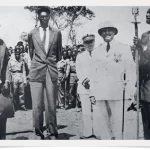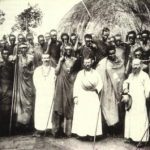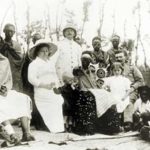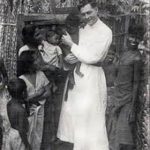Adjudicating-or Avenging-Conflict between the Missions and the Cour
News of the violence at Rwaza may have briefly revived hopes at Court of expelling the Europeans from Rwanda. In early August the Fathers at Save heard that twenty bulls were being sacrificed daily at Nyanza to determine if such an attempt could succeed. Whether theserites actually took place or whether this rumor, like many then circulating, was just another effort by the Court to frighten the Fathers and their followers, the Tutsi did not take advantage of the trouble in the north to attack missions in the center of the kingdom. But they did continue to assail traders and the messengers and porters of the Fathers during August and September. In late August the Court was even so bold as to prevent two government soldiers from landing their boat on the shore of Lake Kivu.
When a caravantraveling to Zaza was pillaged in August, the Fathers raided the area where the attack had occurred. At the homes of several representatives of the Court, they retrieved much of the material that had been taken. They also took several prisoners before being driven away by a volley of arrows. When they reported the incident to Monsignor Hirth in Bukoba, he secured thirty soldiers from the Germans to accompany the caravan that he sent to Zaza several weeks later. While passing through the region of the first attack, this caravan also encountered trouble: in the ensuing battle, the soldiers killed at least ten men, captured others, and pillaged many cattle. They delivered one prisoner, the brother of a local notable, to the mission where the Fathers held him for ransom—for fifteen cattle, a sum which they computed would pay the cost of the ammunition they had used in punishing the area.
After the Fathers at Rwaza had beaten off the attack of the Bakiga and the Fathers at Zaza had taken such harsh reprisals against the assailants of its caravans, the Court reassured the Fathers at Save that it had no intention of making war on any of the missionaries. It also promised them that their envoys would in the future travel freely throughout the kingdom. By late September the Court knew that von Grawert had been apprised of the incidents of July and August and that he would soon be at Nyanza. Aware of the war that the Germans had waged the previous year in Burundi against its uncooperative mwami, the Court dreaded similar punishment, Musinga sent gifts of cattle to the Fathers, even accompanying one such tribute with the declaration that he was the mugaragu of the missionaries. In this way the Court hoped to win the protection of the Fathers against possible German reprisals.
Although willing to show submission to the missionaries, the Court was not yet so frightened as to bow to their wishes completely. On instructions from von Grawert, Musinga heard the case of the Zaza Fathers against the notables whom they held responsible for the pillage of their caravan. One of the accused had already committed suicide during his confinement at the mission. Musinga freed all the rest with the comment that Tutsi simply did not steal. He did, however, deprive one of the accused of his four domains in Gisaka and gave them to the Zaza Fathers in compensation for their losses.
Despite the fears of the Court, von Grawert arrived with the intention of restoring stability rather than meting out punishment. As he informed the Fathers, he did not believe it worthwhile to make war for the sake of a few cloth merchants. The German officer hoped to avoid any open conflict that might lead neighboring colonial powers to think that German control of Rwanda was ineffective. He was also concerned about the internal political situation. Von Grawert’s fellow officer at Bukoba a had reported that he had been asked for assistance by the clients of Ruhinankiko’s protégés Cyaka and Sebuharara who had survived the attack by warriors of the Court at Rwata the previous April. According to the survivors, Kabare wanted to oust both the Europeans and Musinga himself from the kingdom. As von Grawert may have realized, this account was distorted by the survivors’ hopes of winning German support for Musinga and Ruhinankiko, whom he favored. But the report did alert von Grawert to the seriousness of the divisions that split the Court. Fearing that punishment of the mwami might precipitate total collapse, he preferred to be lenient in his judgment of the Court. The district officer was convinced that the attack at Rwaza had been a spontaneous local movement, so he had no trouble absolving the Court of any responsibility in it. He did acknowledge that the Court had sparked the attacks on traders in central Rwanda and ordered it to pay five hundred cattle to merchants who had lost their goods. He blamed the killings of merchants on several of Kabare’s clients who were brought to Nyanza in chains and given twenty-five lashes each.
Von Grawert then left Nyanza for several weeks to tour the rest of Rwanda. At Rwaza, where the threat to European lives had been real and where no considerations of Court politics were involved, he carried out devastating reprisals on the Bakiga who had attacked the mission. In the end the Fathers themselves had to ask mercy for some of their neighbors. The German officer further drove his point home by threatening that if the mission were ever attacked again, he would return to inflict similar damage every six months, just before each harvest, until the people of the area perished.
During von Grawert’s absence from Court, some of his soldiers (probably from East Africa or Burundi) used the opportunity to humiliate the Tutsi prisoners left in their charge. They forced them publicly to eat chicken, the food of Europeans, which the Tutsi considered loathsome. The many important notables who were obliged to witness this act chorused in the background Ishyano mu Rwanda, “What a terrible thing for Rwanda.” Later the soldiers forced the Tutsi notables to lower themselves to the level of the Hutu agrarians by cultivating crops. These insults may have made an even greater impression on the Court than the soldiers’ killing several prisoners who were supposedly trying to escape. Kanjogera was so horrified by these reprisals that she reportedly fled Nyanza, while Kabare was supposed to be making his own preparations to go into hiding.
After von Grawert and his men had left Rwanda, and the immediate sting of the humiliations they had inflicted had eased, the Court could look with some satisfaction on the results of Kabare’s policy of firmer resistance. If the Court had hoped by a combination of harassment of the Europeans’ clients and rumors of attacks to induce the Europeans to leave, this aspect of their policy had failed. But their campaign against traders had cleared Rwanda completely, if only temporarily, of all foreign merchants except two white men. The Court and many notables had profited handsomely from the pillage of the caravans of the traders and missionaries. When in 1905 small groups of traders began drifting back into Rwanda and again causing difficulties, the Court complained to von Grawert’s representative, Lieutenant von Nordeck, who had them arrested and beaten at Nyanza. After von Nordeck had left, the Court felt he had authorized it to deal with traders as it wished: their regiments continued to capture and abuse all those who displeased the Court.In March 1905 von Grawert obtained an ordinance from the governor of German East Africa closing Rwanda to all traders except those licensed by the Germans. One condition of receiving such a license might be the obligation to pay court to Musinga before beginning to trade in Rwanda.This probably reflected the desires of the Court, which did not wish to halt all trade but rather to control it for its own profit.
The two white traders who had continued their commerce in cattle during the worst attacks against foreign merchants were an Austrian named Schindelar and a Boer named Pretorius. Unable to secure the kind and quantity of cattle they wanted for the prices they were willing to pay, the two resorted to taking hostages, beating notables, or simply raiding the most attractive herds. When von Grawert had been in Rwanda in October 1904, he had acted on the Court’s complaint against these two and had required them to make restitution for the cattle stolen. When they later resumed their commerce in northern Rwanda, the Court hesitated to act directly against them and again called for German aid. In the meantime, the Bakiga of the north executed their own form of justice, killing forty-nine of Pretorius’s men, confiscating his cattle, and driving him from the region stripped of even his personal possessions. Lieutenant von Nordeck arrested Schindelar and Pretorius and allowed Musinga to try them. The mwami decided to take two-thirds of their cattle as compensation for the damage they had done, permitting them to keep one-third.
The Fathers turned the Schindelar-Pretorius case to their own advantage. For several months, they had been trying to persuade the Court to grant them yet another mission site, one in the very heartland of the kingdom. After two brusque refusals from Kabare, the missionaries asked von Nordeck to pressure the Court into making the concession. The officer threatened to release the calife traders unless the Court consented to the new foundation. Finding the propaganda of the Fathers less obnoxious than the continued confiscation of the cattle of the kingdom, the Court agreed to the new mission. Von Nordeck then enforced Musinga’s judgment against the traders and expelled them from Rwanda. Both he and the Fathers recognized how hostile the Court was to the new mission, so von Nordeck provided a temporary guard of soldiers for the post, which was established at Kabgayi, not far north of Nyanza.
https://uk.amateka.net/adjudicating-or-avenging-conflict-between-the-missions-and-the-cour/https://uk.amateka.net/wp-content/uploads/2021/04/mariage_roi.jpghttps://uk.amateka.net/wp-content/uploads/2021/04/mariage_roi-150x150.jpgChurch and RevolutionMissionary historyNews of the violence at Rwaza may have briefly revived hopes at Court of expelling the Europeans from Rwanda. In early August the Fathers at Save heard that twenty bulls were being sacrificed daily at Nyanza to determine if such an attempt could succeed. Whether theserites actually took place...BarataBarata rpierre@ikaze.netAdministratorAMATEKA | HISTORY OF RWANDA




